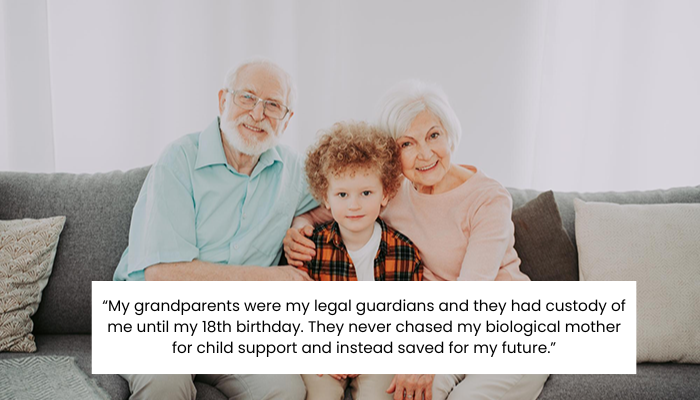AITA for Ignoring My Estranged Mother’s GoFundMe for Her Sick Kid?
This is one of those family stories that makes Reddit blow up with mixed reactions. OP (21M) was left with his paternal grandparents after his father died when he was only 4.5 years old. His biological mother just walked away. For over a decade, she had no contact with him, didn’t ask about his health, his school, or anything a parent should care about. The only time she came around was when she wanted money — from the grandparents, not even to check in on her son.
Fast forward to adulthood, and suddenly, she pops back up again. She’s remarried with four new kids, one of whom is battling cancer. Instead of reaching out to reconnect, she’s asking for help funding her child’s cancer treatment through GoFundMe. OP ignores the link. Then comes the emotional blackmail, guilt trips, and messages from her husband. But OP stands firm — these people aren’t family, not in any real sense. Now he’s asking: AITA for ignoring their cry for help?
There are some family ties that feel more like a financial trap than a loving bond, always ready to take but never to give
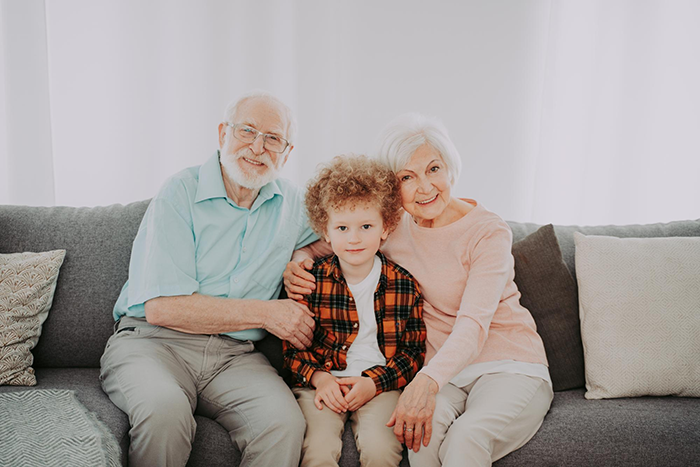
A man was abandoned by his mother at age 4 and raised by his loving grandparents after his father passed away

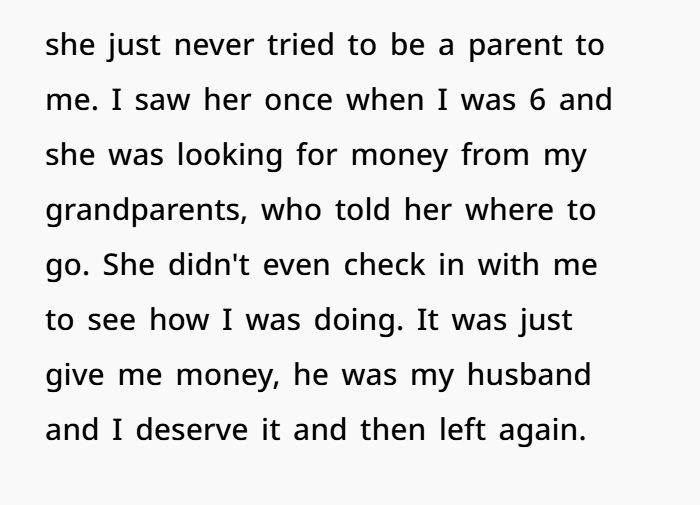
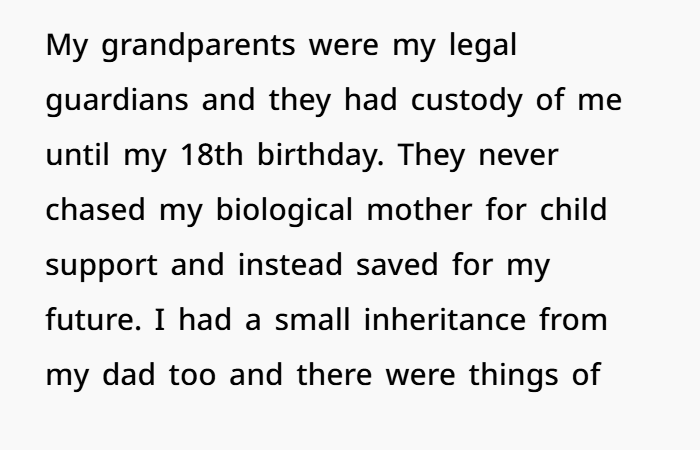








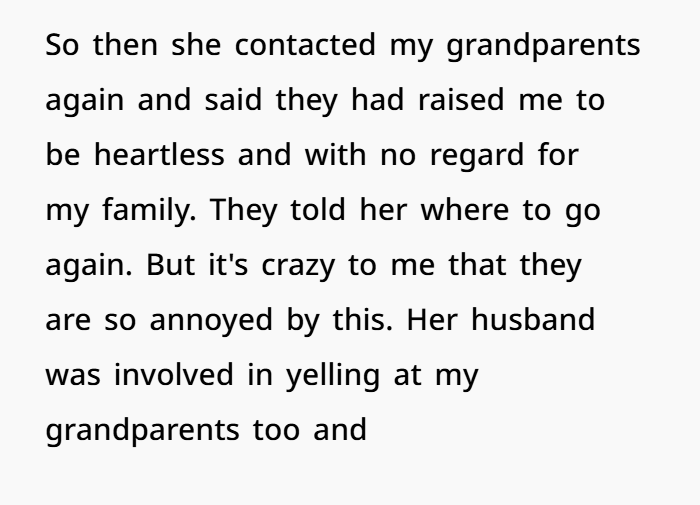


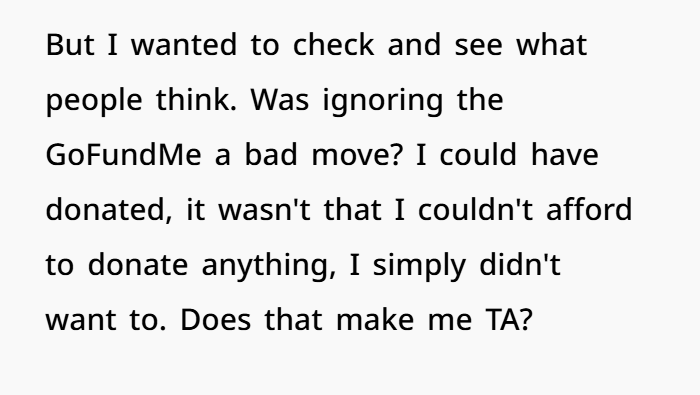
Let’s be real: this is messy. No two ways about it. We’re talking about family estrangement, child abandonment, emotional scars, and now — a sick child. So yeah, a lot of feelings are tangled up in here. But if we’re gonna unpack this, we gotta look at it layer by layer. And honestly? Most people will say: “You’re not the asshole.” But let’s break it down.

1. Childhood Trauma Leaves Scars That Don’t Just Go Away
First off — being abandoned by your mother at the age of four? That hits hard. And not just in the moment. It’s a trauma that lives in your bones. She didn’t just drop the ball — she walked away. No birthday cards, no school visits, not even a single check-in for over a decade. That kind of abandonment changes how you see family.
It’s not cold-hearted to say “I don’t owe you anything.” It’s called emotional self-protection. And when the only contact she’s made is to ask for money? That doesn’t feel like love. That feels like manipulation.
2. Blood Doesn’t Always Mean Family
People love to say “but she’s your mom.” Sorry, but that doesn’t mean what they think it means. Just because someone shares DNA with you doesn’t mean they’re family. Family is built on relationships, love, presence, and effort — not biology.
She didn’t raise you. She didn’t support you. She didn’t try to reconnect out of love — she did it for cash. That’s not a mother-son relationship. That’s a one-sided financial request from a stranger you happen to share genes with.
So no — you don’t owe her or her other kids anything. Especially not financial support.
3. Let’s Talk About GoFundMe Etiquette (and Ethics)
Now, about that GoFundMe. The kid has cancer. And yeah, that’s heartbreaking. No one wants to see a child suffer. But a GoFundMe isn’t a court summons. It’s a request, not a demand.
You’re allowed to say no. People treat GoFundMes like social pressure machines. But in reality, donating to a GoFundMe campaign is optional, not an obligation. Especially when the person running it abandoned you for most of your life.
You didn’t go online and trash the fundraiser. You didn’t attack her or block donations. You just didn’t engage. And that’s okay.
4. High-Conflict Co-Parenting Isn’t Your Responsibility
Let’s throw in another keyword here: co-parenting breakdown. She didn’t co-parent. Your grandparents were your legal guardians. They were your rock, your providers. They sold some of your dad’s things to fund your future. That’s who showed up for you.
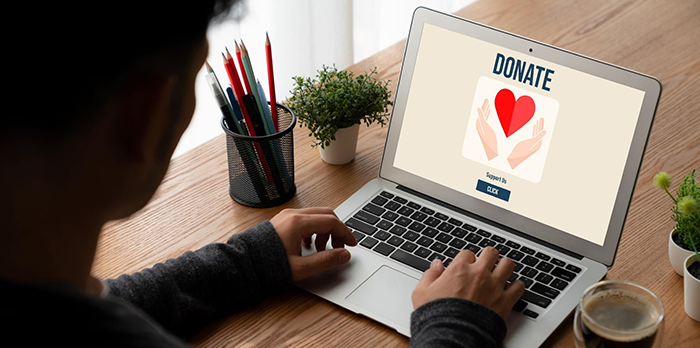
So when your bio mom comes around acting like you owe her or her current family support — it feels like a slap in the face to the people who actually did the work of raising you. That’s not co-parenting. That’s financial leeching.
5. Why the Guilt Tactics Don’t Work Anymore
Saying “you’re heartless” or “your sister’s sick” is emotional manipulation — plain and simple. If she wanted to rebuild a relationship, she would’ve reached out before she needed money. Maybe start with an apology. Or a real conversation. But nope — straight to the wallet.
It’s called financial guilt-tripping, and it’s a tactic a lot of toxic or estranged parents use when they need something. But you’re not required to carry guilt for her bad decisions or her neglect.
6. The Power of Boundaries in Estranged Family Relationships
Here’s a big one: setting healthy boundaries with estranged parents. That’s something more people need to normalize. You did that. You said “no” firmly. You blocked accounts. You protected your peace.
And boundaries aren’t cruelty. They’re self-care. They say, “I know what hurts me, and I won’t let it keep happening.” That’s healthy. That’s mature. That’s how you break the cycle.
7. Should You Have Donated? Let’s Be Real…
Could you have thrown $10 at the GoFundMe to avoid the drama? Sure. But then what? Open the floodgates to more requests? More guilt trips? More manipulation?

When someone shows up only when they want something, and you give in — it teaches them that tactic works. Next time, it’s not $10. It’s $1,000. Or they want you to co-sign a loan. Or give them your inheritance.
You were right to cut that off early. Especially if the money isn’t even going fully to treatment. A lot of GoFundMe campaigns lack transparency, and if only a portion is going to direct medical care, you have every reason to say “no thanks.”
8. What About the Kid?
Yeah, this part’s hard. No one wants to think of a child suffering. But that’s her kid. Not yours. The hard truth is: you can feel bad about a situation without making yourself responsible for it. That kid deserves love and support — but from the people who chose to bring her into the world. Not the half-brother her mom walked out on.
The internet unanimously agreed that he owes his biological mother and her family absolutely nothing
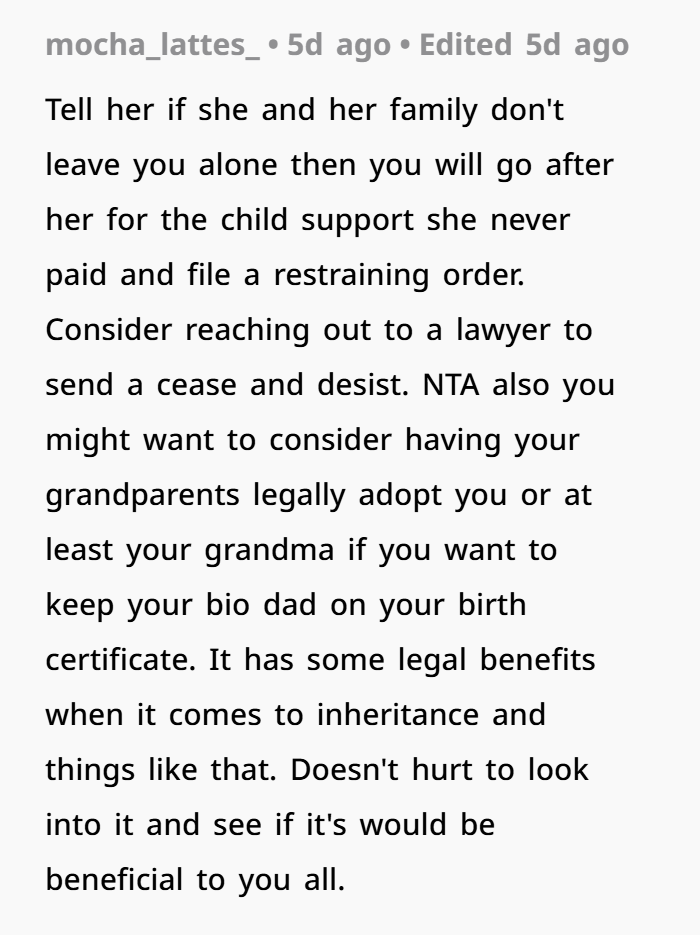

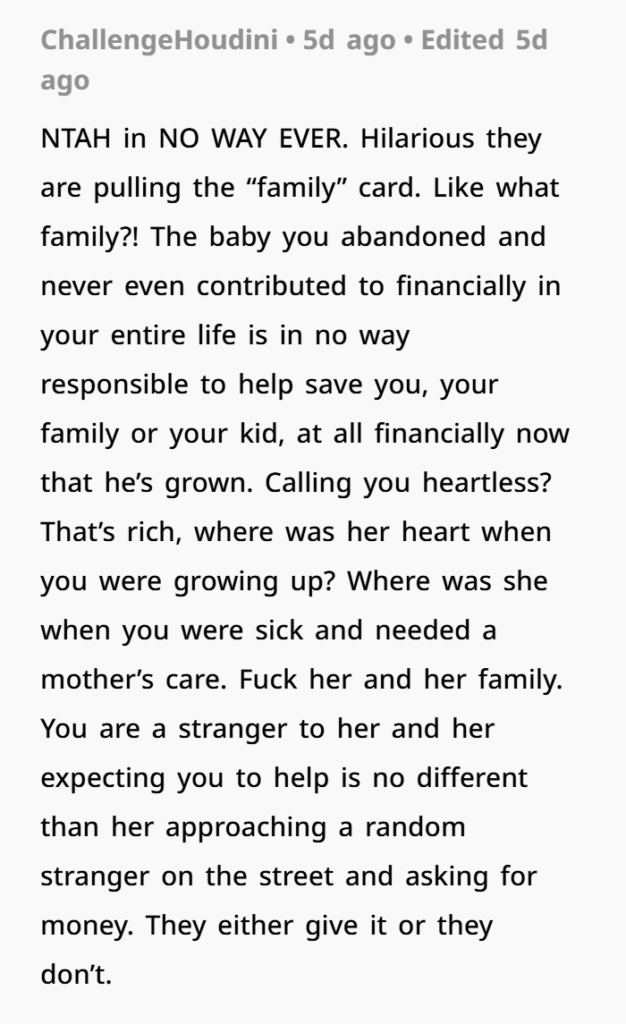

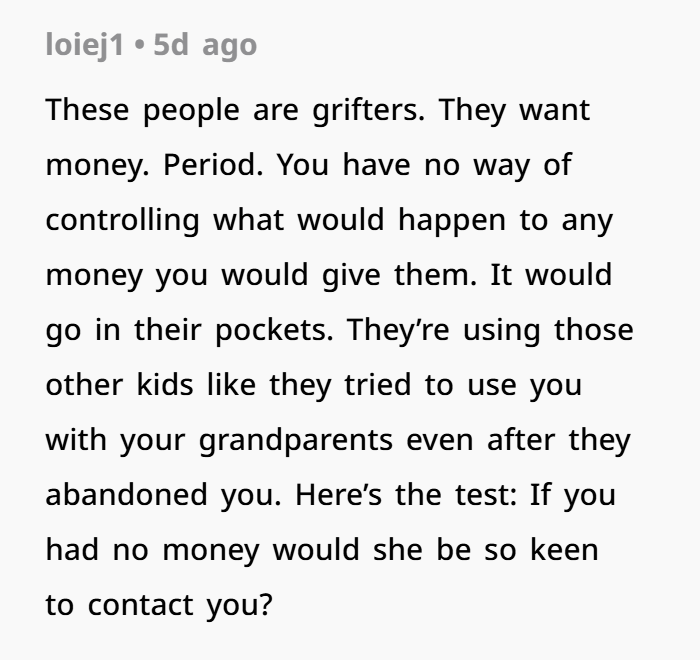


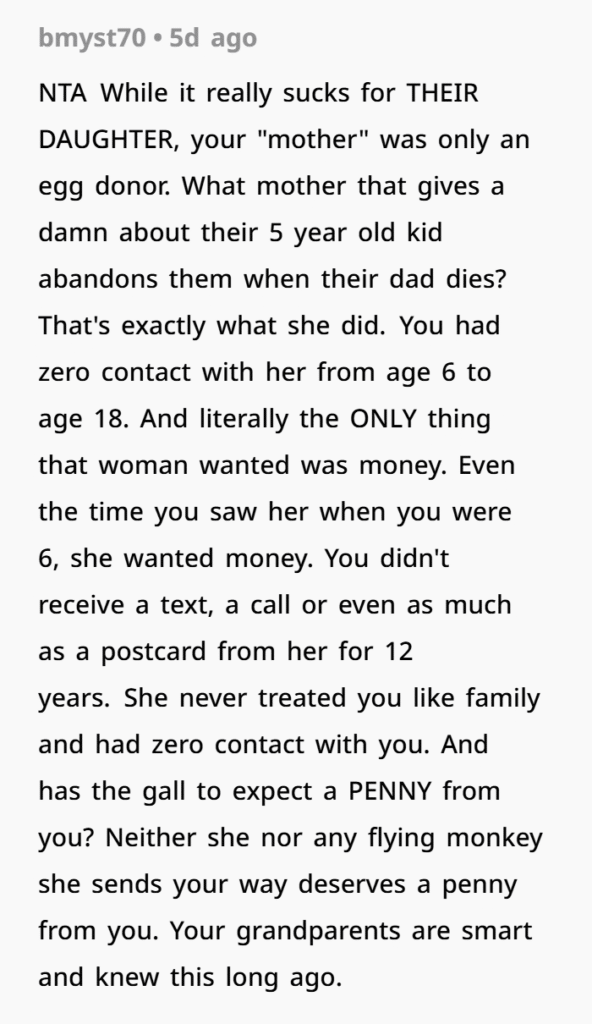
Let’s wrap this up:
- She left. You healed.
- She came back — for money, not love.
- You said no. That’s not cruel. That’s strong.
So no — you’re not the asshole. You’re a survivor of emotional abandonment, someone who learned how to protect their peace and set clear financial and emotional boundaries. That’s powerful. That’s healthy.
And most of all? That’s your right.

